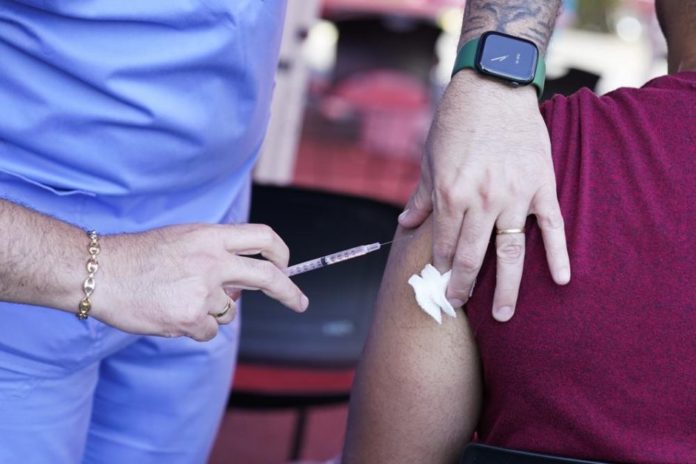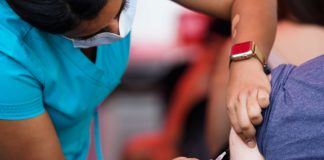
ALBANY — As of Friday, there have been seven known cases of monkeypox among the Capital Region’s 1.1 million residents.
But there are likely more infections that have gone undiagnosed, and a risk of further spread if the rare disease is viewed as a threat only to men who have sex with men, advocates and public health officials say.
The message from public health authorities near and far is that monkeypox is not a gay men’s disease, even if most known U.S. cases so far are in that demographic.
But the recriminations and hate have begun nonetheless, just as the Asian community was the target of increased racism when President Trump called COVID the “China Virus,” said Nathaniel Gray, executive director of the Pride Center of the Capital Region.
“This is traveling in the LGBTQ community because we happened to be the first group exposed,” he said. “That’s just happenstance, it could have happened with any community.”
This perception is doubly problematic, said Keith Brown, acting director of public health for Schenectady County, which saw its first (and so far only) confirmed case late last week. It unfairly stigmatizes one community and lulls everyone else into a false sense of security.
“The media coverage of this as primarily a condition of men who have sex with men is leading people to put their risk pretty low,” Brown said.
That said, the education, testing and, where available, vaccination, must follow the current trends, and focus on the LGBTQ community, which accounts for more than 90% of the infections nationwide, Brown added. It’s a delicate balance of targeting the message without stigmatizing the target of that message.
The state Department of Health has worked for decades to strike such a balance with its AIDS Institute. Johanne Morne, who spent 15 years with the institute, the last six as its director, was recently appointed DOH’s deputy commissioner for health equity and human rights.
Effective response to a crisis, she said, involves outreach to the community affected by that crisis and input from those who have firsthand experiences with it. And AIDS showed the importance of other communities not downplaying or ignoring something that does not currently affect them.
“It was considered to be a gay community’s disease for so long that other indivuduals didn’t recongnize their own risk,” Morne said.
There are not, as of Friday, plans for any wide-scale advisories or directives to slow the spread of monkeypox as were so often issued for COVID, Morne said. But the state will look to the Centers for Disease Control and other expert guidance on this and make changes as needed, she said.
Monkeypox is rarely fatal but it can cause significant discomfort during the infection and leave scarring afterward. It is spread by sustained skin-to-skin contact, such as through sex, massage or kissing, but also through contaminated bedding, towels or clothing.
As of Friday, there had been 2,798 confirmed cases in New York state, 93% of them afflicting New York City residents. The total includes three in Albany County, two in Columbia County and one each in Greene and Schenectady counties.
Among the 192 people with confirmed infections outside New York City, only two were women and only 17 identified themselves as straight — which does not preclude the possibility they had sex with other men.
But there are probably additional cases going unreported by people who have only mild symptoms and or mistake those symptoms for other things, Brown said.
Gray said he is aware, anecdotally, of more cases than the official tally in either Albany or Schenectady counties. Testing has been problematic, he added.
Albany County Health Commissioner Dr. Elizabeth Whalen said the county is well-prepared for this new test after the long fight against COVID but multiple aspects of any widespread response to monkeypox would be hindered at this point.
“Response is easier in that we have the framework established to launch a large-scale community-based vaccine campaign, but we are also experiencing severe staff shortage at the Health Department and find our provider partners are in a similar situation,” she said via email. “We also know that there are concerns about supply chain and shortage for the vaccine, which we are working with the state to learn more on.”
Brown and Whalen both said they are seeing concern from the LGBTQ community about monkeypox.
“We are hearing from people that are interested in being vaccinated, we just don’t have the vaccine yet,” Brown said of Schenectady County.
From July 29 to Aug. 14, only 9,000 doses of vaccine were administered statewide, state data show.
A spokeswoman for Saratoga County, which received the first allocation of monkeypox vaccine of any county in the area, said the calls coming into the county Department of Health about the disease have almost all been queries about the vaccine, rather than about risk and symptoms.
That might be due to the wealth of information available from the state and federal governments, she added. But the county also is not hearing any outpouring of concern about infection.
Brown, who started his public health career working in HIV/AIDS harm reduction in the 1990s, said the LGBTQ community has been an effective advocate for its own health.
“The queer commnity really did drive a lot of the efforts that got us to a place right now where HIV transmission really is quite low,” he said.
The need to take this role is a sore point for some in the LGBTQ community, Gray said, an “underlying tension” or frustration that a health crisis isn’t seen as a crisis while it’s affecting only that one community.
“It affects straight people, the whole world has to be shut down,” he said.
AIDS was initially named GRID — gay-related immune deficiency — when it began to sicken and kill gay men by the thousands in the early 1980s, Gray noted, and it took years to get the rest of America invested in the fight against it.
The official stance on monkeypox in 2022 is very different but the official response is slowed by a cumbersome bureaucracy, he said.
“It’s very likely that we have far more cases than they’re aware of,” Gray said.
More from The Daily Gazette:
Categories: News, News, Saratoga County, Saratoga Springs, Schenectady, Schenectady County








